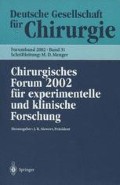Abstract
Blockade of the proangiogenic vascular endothelial growth factor (VEGF) and inhibition of matrix metalloproteinases (MMP) are promising novel treatment strategies for cancer. This study assessed the effects of a neutralizing anti-VEGF antibody (A4.6.1) and a MMP inhibitor (BB-94) on pancreatic cancer (PaCa) in vivo in an orthotopic nude mouse model. Monotherapy with either A4.6.1 and BB-94 significantly reduced tumor size, metastatic spread, and microvessel density in PaCa derived from two cell lines (HPAF-2, AsPC-1), thereby increasing survival. Combined VEGF blockade and MMP inhibition elicited additive effects in tumors derived from moderately differentiated HPAF-2 cells. This study adds further evidence for the therapeutic potential of antiangiogenic VEGF blockade and MMP inhibition in experimental PaCa.
Access this chapter
Tax calculation will be finalised at checkout
Purchases are for personal use only
Literatur
Lieberman SM, Horig H, Kaufman HL (2001) Innovative treatments for pancreatic cancer. Surg Clin North Am 81(3): 715–39
Ferrara N (2001) Role of vascular endothelial growth factor in regulation of physiological angiogenesis. Am J Physiol Cell Physiol 280: C1358–C1366
Heath EI, Grochow LB (2000) Clinical potential of matrix metalloprotease inhibitors in cancer therapy. Drugs 59(5): 1043–1055
Hotz HG, Reber HA, Hotz B, Sanghavi PC, Yu T, Foitzik T, Buhr HJ, Hines OJ (2001) Angiogenesis inhibitor TNP-470 reduces human pancreatic cancer growth. J Gastrointest Surg 5(2): 131 - 138
Bergers G, Brekken R, McMahon G, Vu TH, Itoh T, Tamaki K, Tanzawa K, Thorpe P, Itohara S, Werb Z, Hanahan D (2000) Matrix metalloproteinase-9 triggers the angiogenic switch during carcinogenesis. Nat Cell Biol 2(10): 737–744
Author information
Authors and Affiliations
Rights and permissions
Copyright information
© 2002 Springer-Verlag Berlin Heidelberg
About this paper
Cite this paper
Hotz, H.G., Foitzik, T., Hotz, B., Hines, O.J., Reber, H.A., Buhr, H.J. (2002). Evaluierung einer neuen antiangiogenen Kombinationstherapie für das Pankreaskarzinom: VEGF-Blockade und Matrixmetalloproteinase-Inhibition im Tiermodell. In: Chirurgisches Forum 2002. Deutsche Gesellschaft für Chirurgie, vol 31. Springer, Berlin, Heidelberg. https://doi.org/10.1007/978-3-642-56158-0_10
Download citation
DOI: https://doi.org/10.1007/978-3-642-56158-0_10
Publisher Name: Springer, Berlin, Heidelberg
Print ISBN: 978-3-540-43300-2
Online ISBN: 978-3-642-56158-0
eBook Packages: Springer Book Archive

